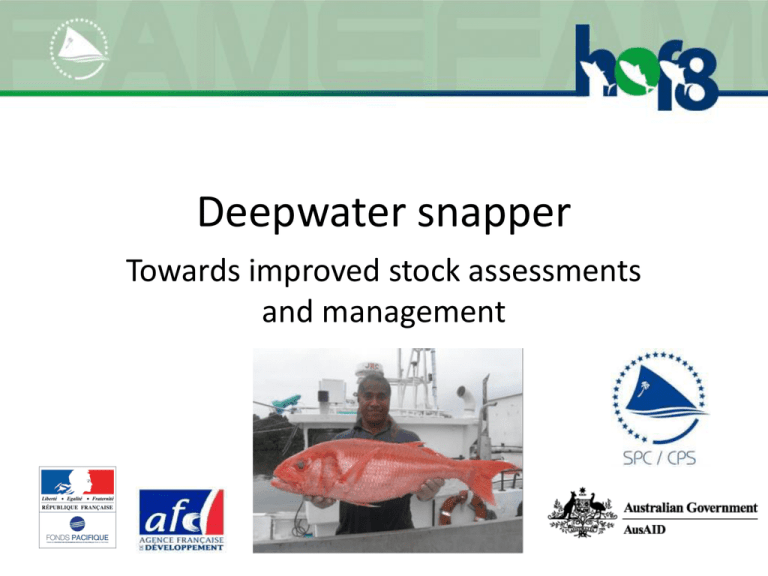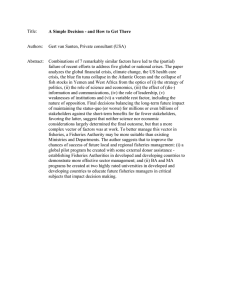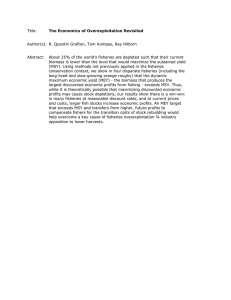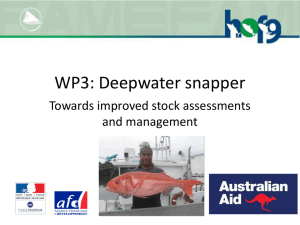Deepwater snapper Towards improved stock assessments and management
advertisement

Deepwater snapper Towards improved stock assessments and management Outline • • • • Background Work plan Progress to date Considerations Background • Deepwater snapper are an important fisheries resource in many PICTs • Declines in catches in some PICTs have raised concerns about sustainability • Quantitative assessments are limited by lack of adequate biological and fisheries data Background • At previous 3 HoF meetings, SPC members requested assistance with deepwater snapper management • At 2011 HoF meeting, members endorsed SPC efforts to seek funding to support deepwater snapper project • SPC obtained funding from: – AusAID (2012-2015) - Vanuatu, Samoa, Tonga, and the Marshall Islands – French Pacific Fund (2011-2013) - New Caledonia – French Development Agency (2012-2013) - New Caledonia Deepwater snapper workshop • • • • Deepwater snapper workshop held at SPC in July 2011 Identify priority information and training needs Participants from 12 PICTs The agreed outcomes from the workshop included a work plan for SPC’s deepwater snapper activities Work Plan There are 4 priority work areas: 1. 2. 3. 4. Fisheries data collection Improving biological knowledge Fisheries assessment and management Capacity development Fisheries Data Collection Aim is to develop a standardised approach to fisheries data collection across the Pacific region – many advantages: 1. Facilitates the development and maintenance of a common database system, which minimises development and maintenance costs; 2. Provides consistency in how and what data are collected and how they are analysed; and 3. Facilitates comparisons of fisheries among countries Fisheries Data Collection Activities • Support development of fisheries monitoring programs in-country (e.g. logsheets and port sampling) • Utilise existing logsheets where feasible, to maintain familiarity in data reporting • Otherwise utilise existing artisanal data forms • Modify existing artisanal fisheries database (TUF-ART) to accommodate deepwater snapper fisheries data Improving Biological Knowledge • A large number of species are captured in deepwater fisheries • Generally assumed that most species are long-lived, slow growing and late to mature • Limited biological information available; longevity, growth and maturity is unknown for many species Improving Biological Knowledge Activities 1. Fisheries independent surveys 2. Fisheries dependent collections (e.g. port sampling) • Estimate longevity, growth rates, maturity schedules and spawning seasons for key species • Examine genetic stock structure to identify management units Fisheries assessment and management • A lack of data has prevented traditional stock assessments for deepwater snapper • A long time series of precise catch and effort data is required • The cost of such data collection would most likely exceed the value of deepwater fisheries in most PICTs. • Is it appropriate to allocate significant resources to support stock assessments for deepwater snapper? Fisheries assessment and management • Depletion experiments used to estimate Maximum Sustainable Yield (MSY) in 80/90’s • MSY may not be most suitable reference point for deepwater snapper, because: 1. Estimates of MSY are usually very uncertain 2. MSY assumes that the environment does not vary 3. Fishing at MSY levels may produce undesirable effects for deepwater snapper fisheries – e.g. while catches at MSY may be sustainable, catch rates may decline to levels that are not economically viable Fisheries assessment and management • Need to develop alternative management indicators and reference points for deepwater snapper • Indicators need to be easy to monitor – e.g. fish size • Indicators and reference points need to be integrated into a formal management framework • Management Procedures (MP) is a useful framework, and is used successfully in other deepwater fisheries • MPs specify the management action(s) that will be taken when indicators reach certain threshold reference points – E.g reduce effort by X% when average fish size is < Ycm Fisheries assessment and management Activities • Characterise deepwater snapper fisheries in each PICT to identify trends and critical data limitations • Develop species distribution models and provide maps of potential habitat for the major target species • Develop indicators and reference points suitable for application within a MP framework Capacity development • Aim to enhance capacity for deepwater snapper management and assessment in home country • Opportunities for Pacific Island Fisheries Officers to complete post-graduate studies • Long-term attachments to SPC to focus on developing skills in data analysis and assessment Progress to date Scientific Cruises Cruises in Fiji, Samoa, Wallis & Futuna, and Tonga Fished 24 seamounts Scientific Cruises • Detailed catch and effort data from lightly exploited populations - useful baseline information for assessments • Biological samples collected from 970 individuals from 16 species Data collection • Supporting deepwater snapper fisheries data collection programs – Tonga, Vanuatu, Samoa • Implemented and supporting biological sampling – Tonga, New Caledonia (>1000 samples) Capacity development AusAID funding provides support for 4 Pacific Island Fisheries Officers to complete postgraduate degrees – Scholarships • Vanuatu – Jeremie Kaltavara (MSc, Australian Maritime College) • Samoa – Ueta Fa’asili Jr (MSc, University of Wollongong) – Attachments, samples and analytical support • Tonga – Hau Halafihi (PhD, University of Canterbury) • Tuvalu – Etuati Poulasi (MSc, Australian Maritime College) Species identification • Collaboration with Genetics lab at University of Hawaii • Identified new species (Etelis marshi) previously thought to be Etelis carbunclus (ruby snapper) Etelis carbunculus Etelis marshi Etelis carbunculus Etelis carbunculus Etelis marshi Etelis marshi Identification cards • Waterproof species identification cards for fishers • Distributed to Fiji, Marshall Islands, New Caledonia, PNG, Samoa, Solomon Islands, Tonga, and Vanuatu Considerations • Heads of Fisheries are invited to: – Note progress that has been made to date – Note that SPC will be providing in-country support to establish fisheries data collection programs, but – Acknowledge that success of the project will be dependent on support from Fisheries Departments – Consider the need for funding beyond the life of this project (2015) Questions?




